人教版 七下 Unit 6 I’m watching TV Section A(2d-3c) 课件(36张PPT)缺少音频
文档属性
| 名称 | 人教版 七下 Unit 6 I’m watching TV Section A(2d-3c) 课件(36张PPT)缺少音频 | 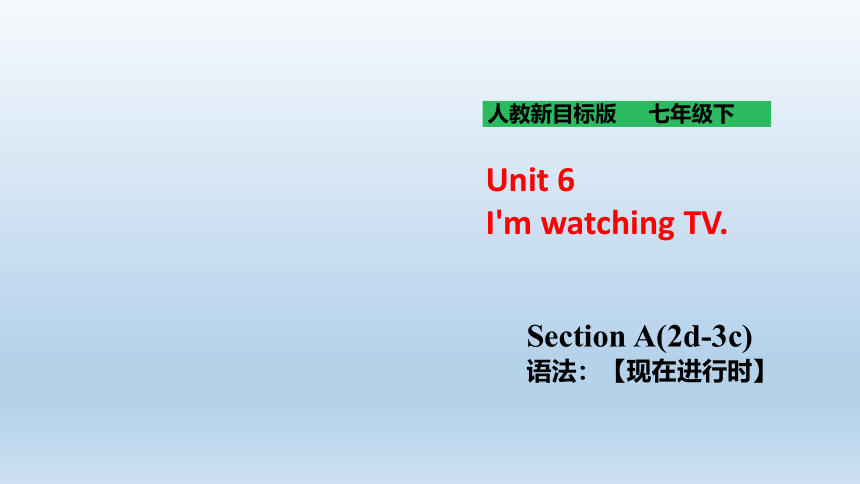 | |
| 格式 | zip | ||
| 文件大小 | 7.7MB | ||
| 资源类型 | 教案 | ||
| 版本资源 | 人教新目标(Go for it)版 | ||
| 科目 | 英语 | ||
| 更新时间 | 2019-04-08 10:04:28 | ||
图片预览

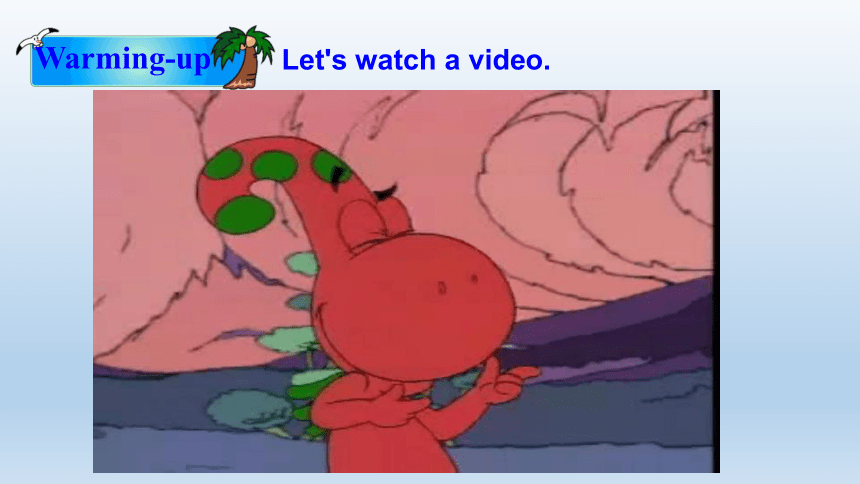
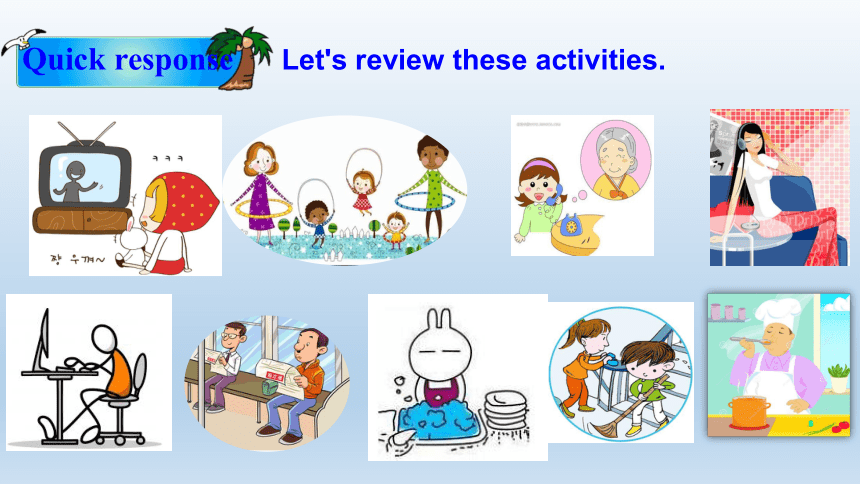
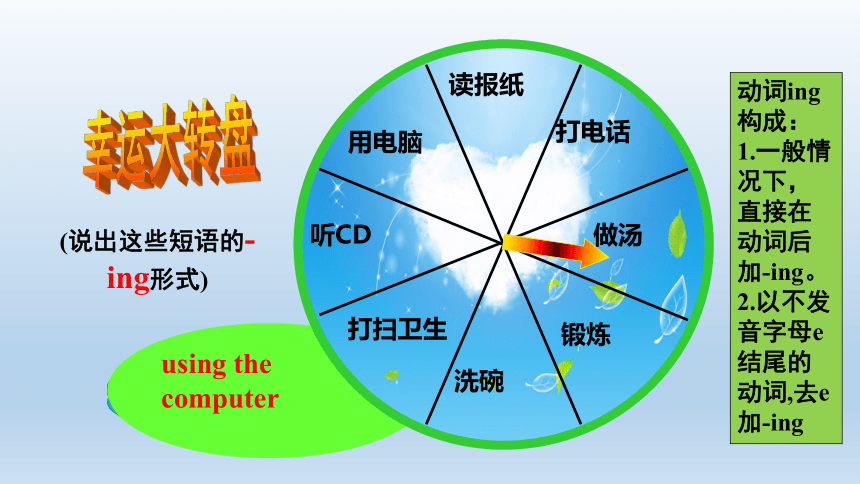


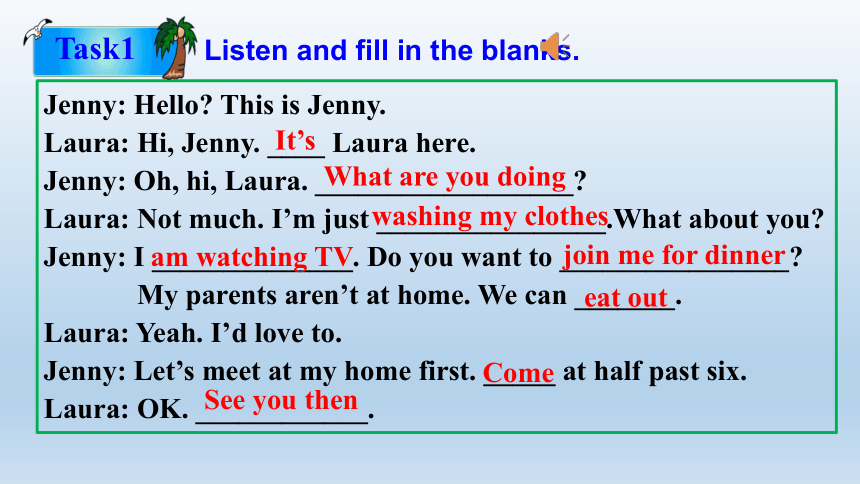
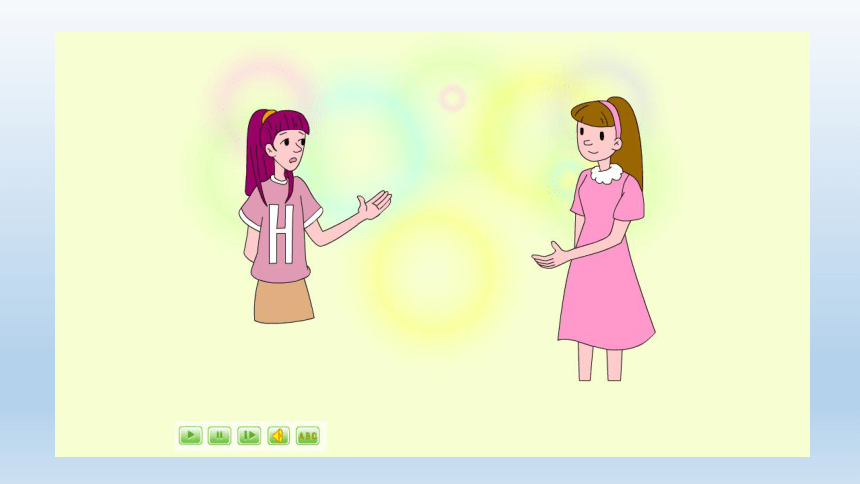
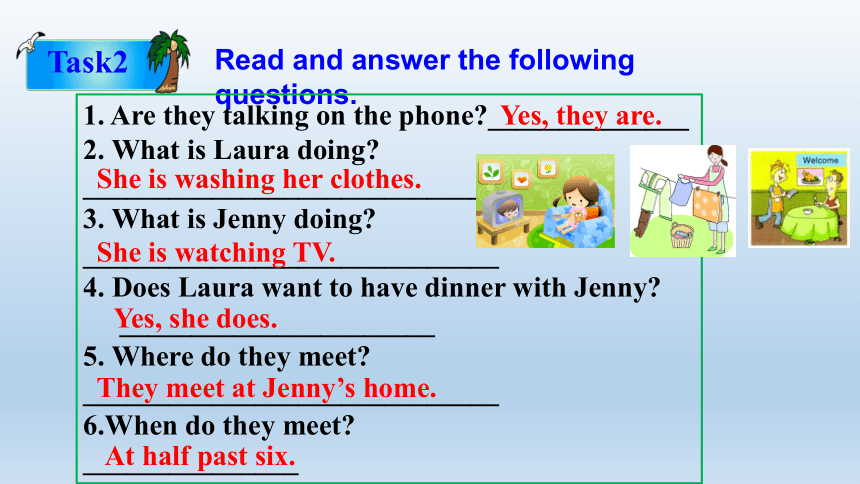
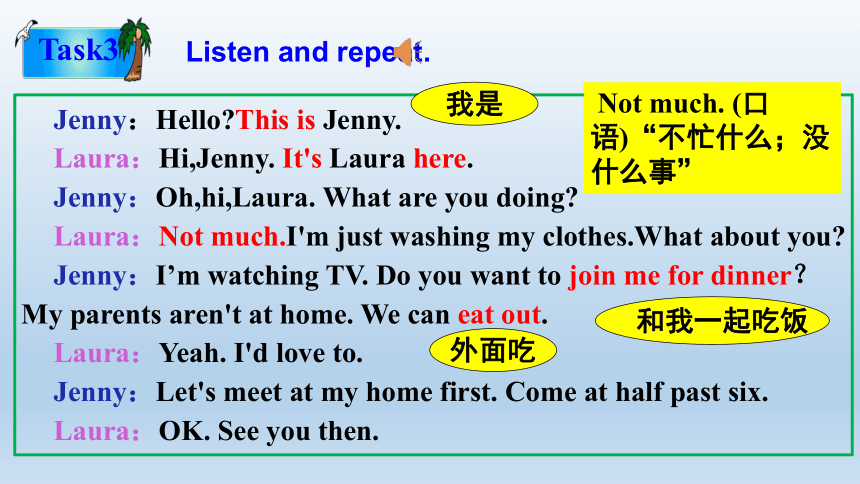

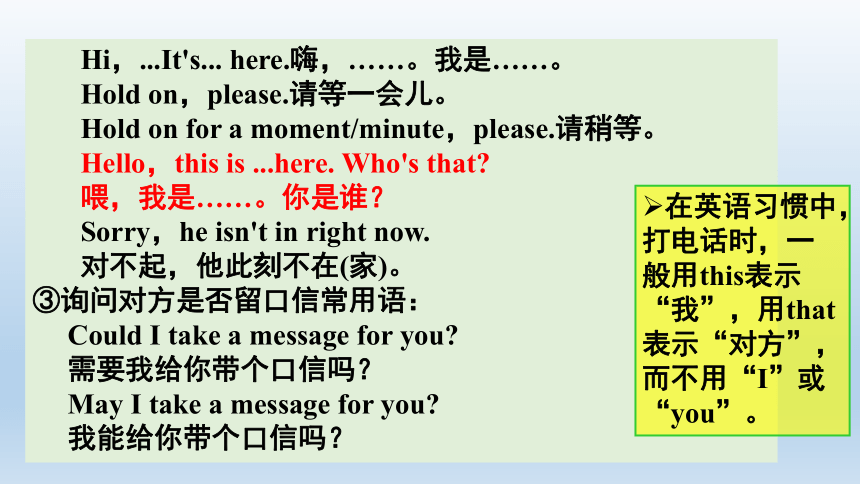
文档简介
课件36张PPT。人教新目标版 七年级下Unit 6
I'm watching TV.Section A(2d-3c)
语法:【现在进行时】Let's watch a video.Warming-upQuick responseLet's review these activities.
making soup
reading a newspaper
talking on the phone
washing the dishes
listening to a CD
exercising
cleaningusing the computer
(说出这些短语的-ing形式)幸运大转盘动词ing构成:
1.一般情况下,直接在动词后加-ing。
2.以不发音字母e 结尾的动词,去e 加-ingPairwork问:What +be +主语+动词ing?答:主语+be+动词ing...Lead-inLauraJennyWhat are they talking about?Jenny: Hello? This is Jenny.
Laura: Hi, Jenny. ____ Laura here.
Jenny: Oh, hi, Laura. __________________?
Laura: Not much. I’m just ________________.What about you?
Jenny: I ______________. Do you want to ________________?
My parents aren’t at home. We can _______.
Laura: Yeah. I’d love to.
Jenny: Let’s meet at my home first. _____ at half past six.
Laura: OK. ____________. See you thenIt’s What are you doing washing my clothesam watching TVjoin me for dinnereat outComeTask1Listen and fill in the blanks.Task2Read and answer the following questions.1. Are they talking on the phone?______________
2. What is Laura doing?
_____________________________
3. What is Jenny doing?
_____________________________
4. Does Laura want to have dinner with Jenny? ______________________
5. Where do they meet?
_____________________________
6.When do they meet?
_______________Yes, they are.She is washing her clothes.She is watching TV.Yes, she does.They meet at Jenny’s home. At half past six.Jenny:Hello?This is Jenny.
Laura:Hi,Jenny. It's Laura here.
Jenny:Oh,hi,Laura. What are you doing?
Laura:Not much.I'm just washing my clothes.What about you?
Jenny:I’m watching TV. Do you want to join me for dinner?My parents aren't at home. We can eat out.
Laura:Yeah. I'd love to.
Jenny:Let's meet at my home first. Come at half past six.
Laura:OK. See you then.Listen and repeat.Task3我是和我一起吃饭外面吃 Not much. (口语)“不忙什么;没什么事”“打电话”专用语小结:
①给对方打电话时的常用语:
May/Could I speak to...(,please)?
(请问)我能和……讲话吗?
Hello,is that...(speaking)?喂,你是……吗?
Hello,this is...(speaking).喂,我是……。
Hello,is...in?喂,……在(家)吗?
②接电话时的常用语:
Who's that (speaking)?你是谁?
Who's speaking?谁在讲话? This is Jenny.我是珍妮。 Hi,...It's... here.嗨,……。我是……。
Hold on,please.请等一会儿。
Hold on for a moment/minute,please.请稍等。
Hello,this is ...here. Who's that?
喂,我是……。你是谁?
Sorry,he isn't in right now.
对不起,他此刻不在(家)。
③询问对方是否留口信常用语:
Could I take a message for you?
需要我给你带个口信吗?
May I take a message for you?
我能给你带个口信吗?在英语习惯中,打电话时,一般用this表示“我”,用that表示“对方”,而不用“I”或“you”。 Do you want to join me for dinner?你想跟我一起吃个饭吗?
Yeah. I'd love to. 我很乐意。本句为省略句,相当于“I’d love to eat out.”。 I’d love to经常用于礼貌地接受他人邀请,也可用I’d like to, 但语气较前者稍弱,其中I’d=I would,常用来回答Would you like to...?提出的问句。
当婉言拒绝他人邀请时,英语多用I’d love to, but...或Sorry, I’m afraid I can’t because...等。【运用】—我进城去,你想跟我一同去吗?
________________________________
—真抱歉, 怕是不成了, 我有好多作业要做。
________________________________I’m going to town. Would you like to join me? Sorry, I’m afraid I can’t because I have lots of homework to do.Fill in the blanks according to the conversation.Task4Laura and Jenny are on the phone.Laura is washing her clothes, and Jenny is ______________. Jenny’s parents aren’t _________. So she asks Laura to join her __________, and they can ________. They will meet at Jenny’s home _____________. watching TVfor dinnerat homeeat outat half past six一分钟倒计时Read the conversation loudly.Then role play in pairs.Task5Jenny:Hello?....
Laura:Hi,Jenny. ...
Jenny:Oh,hi,Laura. ...
Laura:Not much.....
Jenny:I’m ... Do ...?My ... We ...
Laura:Yeah. ...
Jenny:Let's ... Come ....
Laura:OK. See you then.Verbs you hear
playing
dancing
swimming
singing
running
playdanceswimsingrun动词ing构成具体有哪些规律?New drillsWhat is he doing?runplay the guitarwriteswimHe ________________.runningplaying
the guitarwritingswimmingWhat is she doing?eatsingdrawride a bikeShe ________________.eatingsingingdrawingriding a bikehave a partyreadexercise They ________________.What are they doing?having a partyreadingexercising 动词ing(现在分词)的构成规则do-- _____doingread-- _____readingsing-- _____singinghave-- _____havingwrite-- _____writinguse-- _____usingrun-- _____runningswim-- _____swimminglie-- _____lyingdie-- _____dying重读闭音节三要素:
1. 必须是重读音节;
2. 最后只有一个辅音字母;
3.元音字母发短元音 be +v.-ingamisare现在进行时句式结构:be动词使用规则口诀:我用am 你用are
is用于他她它
单数is 复数are时态:be 随着人称、数的变化而变化表示现在(说话瞬间)正在进行的动作现在进行时何时使用现在进行时1.表示现在正在进行的动作,时间状语为now时,通常用现在进行时。2.当句子的开头为Look!或Listen!等时,表明说话时动作正在进行,应该用现在进行时。eg:Steve is playing soccer now.史蒂夫现在正在踢球。eg:Look! They are swimming in the river.看!他们在河里游泳。3.描述图片中人物的动作时,常用现在进行时,使画面更生动。4. 当句子前后的语境、时间等暗示动作正在发生时,也通常用现在进行时。eg:Look at the picture! The children are playing games in the park.
看这张照片!孩子们正在公园玩游戏。eg:— Where is Lily?
— She is on the sofa. She is watching TV.莉莉在哪里?她在沙发上。她正在看电视。现在进行时句式1)肯定句:__________________________
I am reading a book.主语+ be + V-ing + 其它.2)否定句:________________
I am writing.→I am not writing.直接在be后加not3)一般疑问句:________________
肯定回答:_______________
否定回答:__________________
He is reading.
--Is he reading ?
--Yes, he is./No, he isn’t.直接把be提到句首Yes, 主语+be.No, 主语 + be + not.4)特殊疑问句:
疑问词 + be +主语 + 动词-ing + 其他?
My mother is cooking dinner in the kitchen.
我妈妈正在厨房做饭。
→ Where is your mother cooking dinner?
你妈妈正在哪里做饭?
→ What is your mother doing in the kitchen?
你妈妈正在厨房做什么?
→ Who is cooking dinner in the kitchen?
谁正在厨房做饭?注意:划线部分不同,疑问词也不同。 1. 你在做什么? ___________________
2. 我在看电视。 __________________
她在做什么? ___________________
4. 她在洗衣服。 _______________________
5. 他们在做什么?___________________
他们在听CD。 __________________________
你在做作业吗?__________________________
是的。/ 不是。 __________________________I’m watching TV. What are you doing?What’s she doing?She’s washing her clothes. They’re listening to a CD. What are they doing?Are you doing your homework?Yes, I am. / No, I’m not.Grammar focusPractice9. 我在打扫我的房间。_____________________
10. 他在读报纸吗?_______________________
11. 是的。/ 不是。他在打篮球。
__________________________________________
12. 他们在用电脑吗?
_____________________________
13. 是的。/ 不是。他们在锻炼。
__________________________________________
14. 她现在正在锻炼。________________________________
15. 她一般(周一/每天晚上/早晨)锻炼。
________________________________
________________________________Yes, he is./No, he isn’t. He’s playing basketball.Is he reading a newspaper?Are they using the computer?Yes, they are./No, they aren’t. They’re exercising. I’m cleaning my room. She’s exercising (now). She exercises (on Monday/every night/in the mornings/etc.) She ___________________ now, but she often ________________ after lunch.is washing the disheswashes the dishes现在进行时表示此时此刻正在做某事一般现在时表示经常性的动作现在一般时与现在进行时之对比表示经常性、习惯性的动作。
主语 + 动词 +(…)
usually, often, on Mondays,
every day, on weekends,
in the morning/afternoon,
after dinner/school…表示正在进行或发生的动作。 主语 + be + 动词-ing +(…)
时间标志:now, at the moment现在;It's+几点钟; Listen! Look! Keep quiet安静! Don't make noise别吵!…
用所给动词的适当形式填空。1. Listen! Mary _________ ( sing) now.
2. Students __________ (run) on the playground now.
3. My mother _________(watch) TV play every night.
4. The Greens ________(visit) China every year.
5. I ______ (play) sports three times a day.
6. Look! Lucy and Lily __________(read) books.
7. There _______(be) a football match near my home.
8. He ______( go) to the concert on Mondays.
is singing are running watches visit play are readingisPracticegoes3a Write sentences following the examples.1. Jenny/ clean the house/ now
Jenny is cleaning the house now.
2. Bob/ make dinner/ every Saturday
Bob makes dinner every Saturday. 3. Mary’s parents/ drink tea/ after dinner
_______________________________________
4. Bill/ talk on the phone/ now
_________________________________
5. Becky and Bob/watch TV / on weekends
______________________________________Bill is talking on the phone now.Mary’s parents usually drink tea after dinner.Becky and Bob watch TV on weekends.3b Number the sentences in order to make a telephone conversation. Then practice it with a partner.____ Do you want to go tomorrow then?
____ OK. See you tomorrow evening!
____ I’m reading a book.
____ Let’s go at seven o’clock.
____ No, this book is really interesting.
____ What are you doing?
____ Do you want to go to the movies now?
____ Sure, what time?13254687Practice the conversation with your partner.A: What are you doing now?
B: I’m reading a book?
A: Do you want to go to the movies now?
B: No, this book is really interesting.
A: Do you want to go tomorrow then?
B: Sure, what time?
A: Let’s go at seven o’clock.
B: OK. See you tomorrow evening!3cTake turns miming different activities in your group. The others in the group guess what the activities are.
I'm watching TV.Section A(2d-3c)
语法:【现在进行时】Let's watch a video.Warming-upQuick responseLet's review these activities.
making soup
reading a newspaper
talking on the phone
washing the dishes
listening to a CD
exercising
cleaningusing the computer
(说出这些短语的-ing形式)幸运大转盘动词ing构成:
1.一般情况下,直接在动词后加-ing。
2.以不发音字母e 结尾的动词,去e 加-ingPairwork问:What +be +主语+动词ing?答:主语+be+动词ing...Lead-inLauraJennyWhat are they talking about?Jenny: Hello? This is Jenny.
Laura: Hi, Jenny. ____ Laura here.
Jenny: Oh, hi, Laura. __________________?
Laura: Not much. I’m just ________________.What about you?
Jenny: I ______________. Do you want to ________________?
My parents aren’t at home. We can _______.
Laura: Yeah. I’d love to.
Jenny: Let’s meet at my home first. _____ at half past six.
Laura: OK. ____________. See you thenIt’s What are you doing washing my clothesam watching TVjoin me for dinnereat outComeTask1Listen and fill in the blanks.Task2Read and answer the following questions.1. Are they talking on the phone?______________
2. What is Laura doing?
_____________________________
3. What is Jenny doing?
_____________________________
4. Does Laura want to have dinner with Jenny? ______________________
5. Where do they meet?
_____________________________
6.When do they meet?
_______________Yes, they are.She is washing her clothes.She is watching TV.Yes, she does.They meet at Jenny’s home. At half past six.Jenny:Hello?This is Jenny.
Laura:Hi,Jenny. It's Laura here.
Jenny:Oh,hi,Laura. What are you doing?
Laura:Not much.I'm just washing my clothes.What about you?
Jenny:I’m watching TV. Do you want to join me for dinner?My parents aren't at home. We can eat out.
Laura:Yeah. I'd love to.
Jenny:Let's meet at my home first. Come at half past six.
Laura:OK. See you then.Listen and repeat.Task3我是和我一起吃饭外面吃 Not much. (口语)“不忙什么;没什么事”“打电话”专用语小结:
①给对方打电话时的常用语:
May/Could I speak to...(,please)?
(请问)我能和……讲话吗?
Hello,is that...(speaking)?喂,你是……吗?
Hello,this is...(speaking).喂,我是……。
Hello,is...in?喂,……在(家)吗?
②接电话时的常用语:
Who's that (speaking)?你是谁?
Who's speaking?谁在讲话? This is Jenny.我是珍妮。 Hi,...It's... here.嗨,……。我是……。
Hold on,please.请等一会儿。
Hold on for a moment/minute,please.请稍等。
Hello,this is ...here. Who's that?
喂,我是……。你是谁?
Sorry,he isn't in right now.
对不起,他此刻不在(家)。
③询问对方是否留口信常用语:
Could I take a message for you?
需要我给你带个口信吗?
May I take a message for you?
我能给你带个口信吗?在英语习惯中,打电话时,一般用this表示“我”,用that表示“对方”,而不用“I”或“you”。 Do you want to join me for dinner?你想跟我一起吃个饭吗?
Yeah. I'd love to. 我很乐意。本句为省略句,相当于“I’d love to eat out.”。 I’d love to经常用于礼貌地接受他人邀请,也可用I’d like to, 但语气较前者稍弱,其中I’d=I would,常用来回答Would you like to...?提出的问句。
当婉言拒绝他人邀请时,英语多用I’d love to, but...或Sorry, I’m afraid I can’t because...等。【运用】—我进城去,你想跟我一同去吗?
________________________________
—真抱歉, 怕是不成了, 我有好多作业要做。
________________________________I’m going to town. Would you like to join me? Sorry, I’m afraid I can’t because I have lots of homework to do.Fill in the blanks according to the conversation.Task4Laura and Jenny are on the phone.Laura is washing her clothes, and Jenny is ______________. Jenny’s parents aren’t _________. So she asks Laura to join her __________, and they can ________. They will meet at Jenny’s home _____________. watching TVfor dinnerat homeeat outat half past six一分钟倒计时Read the conversation loudly.Then role play in pairs.Task5Jenny:Hello?....
Laura:Hi,Jenny. ...
Jenny:Oh,hi,Laura. ...
Laura:Not much.....
Jenny:I’m ... Do ...?My ... We ...
Laura:Yeah. ...
Jenny:Let's ... Come ....
Laura:OK. See you then.Verbs you hear
playing
dancing
swimming
singing
running
playdanceswimsingrun动词ing构成具体有哪些规律?New drillsWhat is he doing?runplay the guitarwriteswimHe ________________.runningplaying
the guitarwritingswimmingWhat is she doing?eatsingdrawride a bikeShe ________________.eatingsingingdrawingriding a bikehave a partyreadexercise They ________________.What are they doing?having a partyreadingexercising 动词ing(现在分词)的构成规则do-- _____doingread-- _____readingsing-- _____singinghave-- _____havingwrite-- _____writinguse-- _____usingrun-- _____runningswim-- _____swimminglie-- _____lyingdie-- _____dying重读闭音节三要素:
1. 必须是重读音节;
2. 最后只有一个辅音字母;
3.元音字母发短元音 be +v.-ingamisare现在进行时句式结构:be动词使用规则口诀:我用am 你用are
is用于他她它
单数is 复数are时态:be 随着人称、数的变化而变化表示现在(说话瞬间)正在进行的动作现在进行时何时使用现在进行时1.表示现在正在进行的动作,时间状语为now时,通常用现在进行时。2.当句子的开头为Look!或Listen!等时,表明说话时动作正在进行,应该用现在进行时。eg:Steve is playing soccer now.史蒂夫现在正在踢球。eg:Look! They are swimming in the river.看!他们在河里游泳。3.描述图片中人物的动作时,常用现在进行时,使画面更生动。4. 当句子前后的语境、时间等暗示动作正在发生时,也通常用现在进行时。eg:Look at the picture! The children are playing games in the park.
看这张照片!孩子们正在公园玩游戏。eg:— Where is Lily?
— She is on the sofa. She is watching TV.莉莉在哪里?她在沙发上。她正在看电视。现在进行时句式1)肯定句:__________________________
I am reading a book.主语+ be + V-ing + 其它.2)否定句:________________
I am writing.→I am not writing.直接在be后加not3)一般疑问句:________________
肯定回答:_______________
否定回答:__________________
He is reading.
--Is he reading ?
--Yes, he is./No, he isn’t.直接把be提到句首Yes, 主语+be.No, 主语 + be + not.4)特殊疑问句:
疑问词 + be +主语 + 动词-ing + 其他?
My mother is cooking dinner in the kitchen.
我妈妈正在厨房做饭。
→ Where is your mother cooking dinner?
你妈妈正在哪里做饭?
→ What is your mother doing in the kitchen?
你妈妈正在厨房做什么?
→ Who is cooking dinner in the kitchen?
谁正在厨房做饭?注意:划线部分不同,疑问词也不同。 1. 你在做什么? ___________________
2. 我在看电视。 __________________
她在做什么? ___________________
4. 她在洗衣服。 _______________________
5. 他们在做什么?___________________
他们在听CD。 __________________________
你在做作业吗?__________________________
是的。/ 不是。 __________________________I’m watching TV. What are you doing?What’s she doing?She’s washing her clothes. They’re listening to a CD. What are they doing?Are you doing your homework?Yes, I am. / No, I’m not.Grammar focusPractice9. 我在打扫我的房间。_____________________
10. 他在读报纸吗?_______________________
11. 是的。/ 不是。他在打篮球。
__________________________________________
12. 他们在用电脑吗?
_____________________________
13. 是的。/ 不是。他们在锻炼。
__________________________________________
14. 她现在正在锻炼。________________________________
15. 她一般(周一/每天晚上/早晨)锻炼。
________________________________
________________________________Yes, he is./No, he isn’t. He’s playing basketball.Is he reading a newspaper?Are they using the computer?Yes, they are./No, they aren’t. They’re exercising. I’m cleaning my room. She’s exercising (now). She exercises (on Monday/every night/in the mornings/etc.) She ___________________ now, but she often ________________ after lunch.is washing the disheswashes the dishes现在进行时表示此时此刻正在做某事一般现在时表示经常性的动作现在一般时与现在进行时之对比表示经常性、习惯性的动作。
主语 + 动词 +(…)
usually, often, on Mondays,
every day, on weekends,
in the morning/afternoon,
after dinner/school…表示正在进行或发生的动作。 主语 + be + 动词-ing +(…)
时间标志:now, at the moment现在;It's+几点钟; Listen! Look! Keep quiet安静! Don't make noise别吵!…
用所给动词的适当形式填空。1. Listen! Mary _________ ( sing) now.
2. Students __________ (run) on the playground now.
3. My mother _________(watch) TV play every night.
4. The Greens ________(visit) China every year.
5. I ______ (play) sports three times a day.
6. Look! Lucy and Lily __________(read) books.
7. There _______(be) a football match near my home.
8. He ______( go) to the concert on Mondays.
is singing are running watches visit play are readingisPracticegoes3a Write sentences following the examples.1. Jenny/ clean the house/ now
Jenny is cleaning the house now.
2. Bob/ make dinner/ every Saturday
Bob makes dinner every Saturday. 3. Mary’s parents/ drink tea/ after dinner
_______________________________________
4. Bill/ talk on the phone/ now
_________________________________
5. Becky and Bob/watch TV / on weekends
______________________________________Bill is talking on the phone now.Mary’s parents usually drink tea after dinner.Becky and Bob watch TV on weekends.3b Number the sentences in order to make a telephone conversation. Then practice it with a partner.____ Do you want to go tomorrow then?
____ OK. See you tomorrow evening!
____ I’m reading a book.
____ Let’s go at seven o’clock.
____ No, this book is really interesting.
____ What are you doing?
____ Do you want to go to the movies now?
____ Sure, what time?13254687Practice the conversation with your partner.A: What are you doing now?
B: I’m reading a book?
A: Do you want to go to the movies now?
B: No, this book is really interesting.
A: Do you want to go tomorrow then?
B: Sure, what time?
A: Let’s go at seven o’clock.
B: OK. See you tomorrow evening!3cTake turns miming different activities in your group. The others in the group guess what the activities are.
同课章节目录
- Unit 1 Can you play the guitar?
- Section A
- Section B
- Unit 2 What time do you go to school?
- Section A
- Section B
- Unit 3 How do you get to school?
- Section A
- Section B
- Unit 4 Don't eat in class.
- Section A
- Section B
- Unit 5 Why do you like pandas?
- Section A
- Section B
- Unit 6 I'm watching TV.
- Section A
- Section B
- Review of Units 1-6
- Unit 7 It's raining!
- Section A
- Section B
- Unit 8 Is there a post office near here?
- Section A
- Section B
- Unit 9 What does he look like?
- Section A
- Section B
- Unit 10 I'd like some noodles.
- Section A
- Section B
- Unit 11 How was your school trip?
- Section A
- Section B
- Unit 12 What did you do last weekend?
- Section A
- Section B
